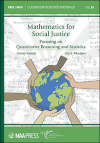- About MAA
- Membership
- MAA Publications
- Periodicals
- Blogs
- MAA Book Series
- MAA Press (an imprint of the AMS)
- MAA Notes
- MAA Reviews
- Mathematical Communication
- Information for Libraries
- Author Resources
- Advertise with MAA
- Meetings
- Competitions
- Programs
- Communities
- MAA Sections
- SIGMAA
- MAA Connect
- Students
- MAA Awards
- Awards Booklets
- Writing Awards
- Teaching Awards
- Service Awards
- Research Awards
- Lecture Awards
- Putnam Competition Individual and Team Winners
- D. E. Shaw Group AMC 8 Awards & Certificates
- Maryam Mirzakhani AMC 10 A Awards & Certificates
- Two Sigma AMC 10 B Awards & Certificates
- Jane Street AMC 12 A Awards & Certificates
- Akamai AMC 12 B Awards & Certificates
- High School Teachers
- News
You are here
Mathematics for Social Justice: Focusing on Quantitative Reasoning and Statistics

Buy Now:
Publisher:
AMS
Publication Date:
2022
Number of Pages:
287
Format:
Paperback
Series:
Classroom Resource Materials
Price:
60.00
ISBN:
978-1-4704-4927-8
Category:
Collection
[Reviewed by , on ]
Blain Patterson
04/10/2022
See our review of the companion volume: Mathematics for Social Justice: Resources for the College Classroom.
Mathematical for Social Justice: Focusing on Quantitative Reasoning and Statistics is a collection of resources for mathematics instructors interested in incorporating social justice topics in their classrooms edited by Gizem Karaali and Lily S. Khadjavi. This book primarily focuses on providing instructors with classroom-tested modules that include concrete tasks and activities. The goal of these activities is to afford students the opportunity to engage with social justice topics using the mathematical knowledge they have previously developed. Many of these tasks are open-ended and use real-world data, giving students free rein to ask their own questions and draw their own conclusions, empowering students to approach social justice topics with more confidence.
This book is organized into a series of 17 modules that cover a variety of themes, including electoral issues, environmental justice, equity, human rights, gentrification, gerrymandering, and policing. These modules are meant to provide instructors with concrete examples of tasks and activities to engage students in their classrooms. For the sake of consistency, each module is organized using the following format: mathematical content, social justice background, instructor preparation, the module itself, and thoughts and reflections.
The mathematical content of the module clearly describes applicable courses, prerequisite mathematical ideas, and mathematical learning goals. The social justice background lays out the underlying social, political, and economic context as well as background information that both the students and instructors should know. The instructor preparation provides direct instructions and supplementary suggestions for the instructor to effectively implement the module in their classroom. Finally, the thoughts and reflections section suggests topics for further investigation as well as reflections from the authors when implemented in their classrooms. This consistent format makes it easy for instructors to find the appropriate information efficiently.
Mathematics for Social Justice: Focusing on Quantitative Reasoning and Statistics is primarily recommended for those looking to incorporate social justice topics in their mathematics classrooms. This could also be used as a supplementary textbook for undergraduates in a teacher preparation program or graduate students in a master’s in teaching program, as this book gives insight into how one might use mathematics to discuss social justice issues. In any case, this book provides the reader with an abundance of resources on mathematics for social justice.
Dr. Blain Patterson (pattersonba@vmi.edu) is an Assistant Professor of Applied Mathematics at the Virginia Military Institute. His research focuses on teacher content knowledge as well as improving teaching and learning in undergraduate mathematics classrooms.
See the publisher's website.
- Log in to post comments




